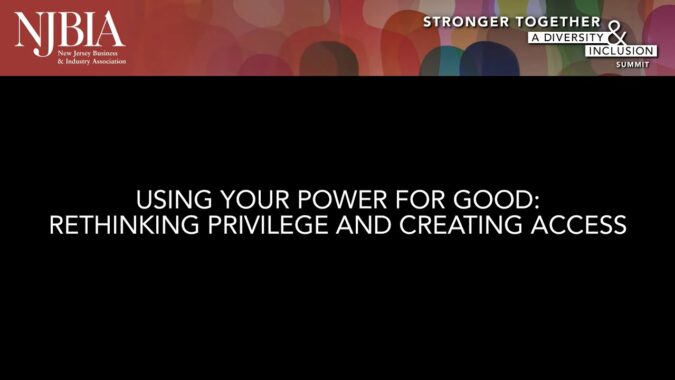When people are asked to reflect if they have benefited from “white male privilege” in their education and careers, they usually become defensive and incorrectly perceive the question as an accusation that they have not worked hard for their professional accomplishments.
Experts at NJBIA’s recent Diversity Equity & Inclusion summit said the challenge is to understand that two things can be true at the same time: Yes, you have worked hard in your life, but you have also encountered fewer roadblocks along the way than people of color, women, and members of the LGBTQ community.
“Can I have worked really, really hard … but also understand that there were no impediments to me working hard because of how I look, sound, where I live, and the family that I was born into?” Brittany Hale, founder and CEO of the BND Consulting Group asked during the “Rethinking Privilege and Creating Access” panel discussion.
Hale said that instead of being defensive, she urges people to be curious about how privilege has impacted their own lives and career trajectory because that is the first step in working toward removing the unconscious bias that holds back others.
“When I work with clients, before we do any assessments, any training, we always have a conversation about mindset,” Hale said. “It’s not about a personal character flaw, it’s about how our brains operate.”
Attorney Robyn Gigl, a transgender woman and activist for the LGBTQ community, said privilege is something she did not even realize she had – until it was gone.
“I bring a unique perspective to privilege in that I am the only one on the panel that has had the benefit of having heterosexual white male privilege throughout a large portion of my life,” said Gigl, a partner at Gluck Walrath.
“I didn’t transition until I was in my 50s. Looking back, I can see how different the course of my life may have been had I been born a cisgender female,” Gigl said.
Growing up in the 1960s, Gigl’s sister, who was a much smarter student, was told by their father that she had to attend a local college. Meanwhile, Gigl as a young man was given the opportunity to choose any college in the country that offered him admission.
“That’s an example of privilege that I didn’t even realize that I had at that time,” Gigl said.
“And when I look back at the careers of women that I went to law school with, I understand how much harder they had to work,” Gigl said. “Nobody handed me anything, but there were no barriers put in my way either.”
“No one asked me at a job interview when you know my wife was pregnant with our second child and we had an 18-month-old, ‘How are you going to handle all of the family obligations you have?’” Gigl said. “Because I was being perceived as a male at that point in time. And they didn’t perceive that I had those obligations, whereas the women in my generation, those questions were asked of them all the time.”
Go here to watch the complete June 23 panel discussion, which also included West Bergen Mental Healthcare CEO Michael Tozzoli, that was moderated by MRW Consulting Group International President Muriel Watkins.

